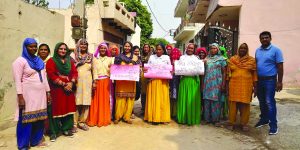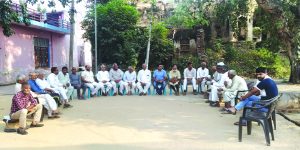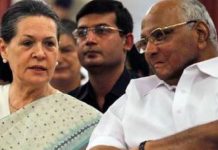 In 2003, Meera* from Malda, West Bengal was only 16 when she was sold off as a ‘bride’ to Vijay* in Mewat, Haryana, who was ten years older than her. After just two years of marriage, she was again sold to a party at a price of 50,000. The reason? She had given birth to two daughters.
In 2003, Meera* from Malda, West Bengal was only 16 when she was sold off as a ‘bride’ to Vijay* in Mewat, Haryana, who was ten years older than her. After just two years of marriage, she was again sold to a party at a price of 50,000. The reason? She had given birth to two daughters.
A year after Meera was married off the first time, another 15-year-old girl from Assam, Laxmi*, was sold off as a bride to 29-year-old Naresh in Jind, Haryana. Post her wedding, Laxmi was made to forcibly either work in Naresh’s farm or rear the family’s cattle. Today, with only a vague hold of her identity, she lives a life of a widow with her two sons and no property to her name.
Meera and Laxmi’s cases are not exceptional. Bride trafficking is quite common in a state like Haryana where many men are compelled to look for wives outside their community due to a skewed gender ratio within the community — a problem sowed by the members of this community itself.
There are many cases that tell the ordeal of trafficked brides from other states where they were treated as commodity, mostly brought at a price (20,000 to 1,50,000 and above) to take care of household chores, work as free labour at farms or otherwise, for producing sons as heir for the families.
 A recent report released by the state government claims that the abysmal sex ratio in Haryana has improved from 832 girls for every 1,000 boys in 2012 to 920 girls per 1000 boys in August 2019. Nevertheless, the trend of bride trafficking doesn’t seem to end in the state anytime soon.
A recent report released by the state government claims that the abysmal sex ratio in Haryana has improved from 832 girls for every 1,000 boys in 2012 to 920 girls per 1000 boys in August 2019. Nevertheless, the trend of bride trafficking doesn’t seem to end in the state anytime soon.
Many decades have passed but Haryana’s brides (from outside the state) are still tagged as mall ki bahu (shopping mall brides), a term that has led the whole state to fall into disgrace. Though the state government takes the credit for improving the sex ratio, giving it another reason to boast about the massive campaign — Beti Bachao, Beti Padhao — it is still far from shedding its label as the state of mall ki bahus.
However, a glimmer of hope has emerged as at least some parts of the state have been actively coming out against trafficking and are taking steps to save the victims. In a bid to offer equal representation to trafficked brides, the state’s Kharkari village has started a massive campaign called Pardeshi Bahu Hamaari Shaan (non-state brides are our pride). With this initiative, Kharkari becomes India’s first village to come forward to fight against bride trafficking.
The convenor of the campaign Pardeshi Bahu Hamaari Shaan, Sunil Jaglan, chose Kharkari to kick-start the campaign on 26 October, 2019, after seeing a positive outlook among the villagers to fight the decades old taboo of bride trafficking.
Jaglan, who is the director of Selfie With Daughter Foundation, has established the campaign named Pardeshi Bahu Hamaari Shaan to honour the brides bought from other states and also to help shed the tag of ‘sold brides.’
Speaking with the reporter, Jaglan says, “I am fighting for the rights of trafficked brides in the patriarchal society of Haryana who were illegally bought, lured or forced into coming to our state. It’s time that these brides should be honoured with full respect as they are one of us now.”
“Haryana is mostly known for all the wrong reasons to the outside world. But, the time has come now to own up to our mistake and give the equal status to the trafficked brides who were bought to the state from parts of West Bengal, Assam, Uttar Pradesh, Bihar and others,” says Sunil.
The Selfie With Daughter Foundation, a prominent name in the annals of women empowerment, has come out with the figures of a survey, conducted between July 2017 and September 2019, of brides who have been trafficked to Haryana from other states. His team of 125 volunteers has, in fact, tracked down a total of 1,30,000 brides, who have been illegally married off to men from Haryana.
As per the survey, over 60 cases have been identified in Mewat alone, where most of the trafficked girls are from the southern states of India. According to Jaglan, Gurugram and Revari were the first places in Haryana where the people bought brides from other states.
Initially, the brides were bought from West Bengal, but now people from Haryana have started buying girls from Bihar, Uttar Pradesh, Assam, Madhya Pradesh and Uttarakhand. From the last three years, the trend of buying the brides from Punjab has also started.
The trend of buying brides from other states began in the area of Ahirwal. After southern Haryana, the percentage of ‘sold brides’ is rampant in Rohtak, Jind, Sonipat, Hisar, Kaithal, Jhajjar, Yamuna Nagar, and Kurukshetra. Such brides are found more in the homes of Jats, Yadavs, and Brahmins.
Additionally, the Ror caste of Atta Satta and Tigdi has been found to have a significant population of brides bought from other states. The district of Mewat has also been found to have an increasing population of brides, who have been sold in the last decade.
Support pours in
In addition to the campaign, a marriage registration camp will be organised in Haryana in December, which would allow couples to formally register their marriages. The camp would help in identifying cases where the brides might have been trafficked. The registration of marriages, involving sold brides, will be greatly beneficial for such women coming from other states, giving them an equal place in the society, besides preventing cases of unfair practices where some brides are ousted by their families on trivial issues.
The idea to set up the marriage registration camp was supported by Kharkari wholeheartedly. In fact, in October itself, as many as 22 men from the village sat down to discuss how the camp could help in tracking trafficking survivors and rectify the image of the state outside. When this reporter asked if they would participate in the exercise themselves, the group put their hands up enthusiastically and said, “Yes, we will!”
Kharkari will now host the marriage registration camp, which will then be organised in the villages of other districts.
Speaking to the reporter, Ram Singh, who is over 80 years old, says that some men have brought shame to the society by buying brides through illegal means and are treating them with disrespect and torture. “This should stop!” reiterated Singh, “if our men want to marry outside Haryana then they should go through the customs and legal formalities, but not through illegal means.”
“Initially, we didn’t know how important it is to register your marriage but, now as I know, first thing I will do is to register my own marriage. I even encourage all the couples, both young and old, to take part in the exercise”
Ramher Sharma, who is also from the same Kharkari village says that an initiative like marriage registration “will bring a good name to the state and will encourage other states with a record of trafficking to follow the same footsteps…I will definitely come with my wife to register in the camp.”
Another village man Charan Singh (40) expressed his appreciation for the initiative. He said, “This step will ensure that the sold brides enjoy the same rights as other local brides and help erase the stigma.”
A new twist
In another twist to bride trafficking cases, some of the sold brides have been found involved into the act of robbery which have been growing in numbers in the state. There is a nexus run by traffickers with girls’ families hand in gloves where they look for families with bachelors.
Due to this occurrence, now all the trafficked brides are labeled as the ‘robber brides.’ Around 1,470 brides after being sold in the state have either returned home or escaped after looting valuables from the homes, which also includes cases where the parents of the under-age girls have filed cases, where the boy’s family had to pay up to them after legal intervention.
For the fear of losing social stature, the number of cases filed by families against robber brides or the brides escaping after fraud was found to be just around 30.
The real reasons
It is noteworthy to mention during 2014 Lok Sabha elections in Haryana, Sunil Jaglan had established the ‘Unmarried Male Association’, and initiated the “Vote Do, Bahu Lo” campaign to educate the candidates about how due to worsening sex ratio unmarried youth were forced to get the brides from other states after selling their land. This issue had gone from national to international in a very short time.
While it is commonly understood that cases of trafficking exist because of the perpetrators’ sexual demands, Jaglan says that the issue is far more complicated than it seems. He explains that are there are two important factors that have majorly pushed instances of bride trafficking in Haryana. One of them relates to property ownerships.
Families in Haryana usually transfer ownership of properties to married sons. This means that whosoever is unmarried cannot claim rights to the property. Usually, in families where there are over two sons, parents dissuade the third son from getting married so as to not divide the property any further. In such situation, the unmarried son might look out for girls through brokers so that are not left without any right to the ancestral property. And, given the skewed sex ration in Haryana, brokers get these girls from poor families in other states — for a price.
The second factor, Jaglan says, is about families in Haryana trying to ensure that the family’s name survives through male heirs. This also explains why Meera was resold after giving birth to two daughters.
Another contributing factor to bride trafficking is that many families with sons who are not fit physically or mentally, entrust brokers with a task of getting girls from poor families who would be forced to marry the sons.
Meanwhile, the preparation for the upcoming marriage registration camp is in full swing which is expected to start working this December. Jaglan, who became famous for the “Selfie with Daughter” campaign in his village Bibipur, is working closely with 125 volunteers and Amit Khatri, Deputy Commissioner of Gurgaon, to make it a successful event. The event will honour couples with prizes and appreciation certificates..
letters@tehelka.com













